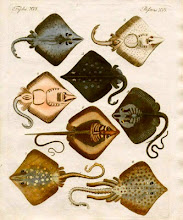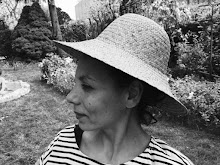Hero*
[extract]
I can tell by the way my mother chews her toast
whether she had a good night
and is about to say a happy thing
or not.
Not.
She puts her toast down on the side of her plate.
You know you can pull the drapes in that room, she begins.
This is a coded reference to one of our oldest arguments,
from what I call The Rules of Life series.
My mother always closes her bedroom drapes tight before going to
bed at night.
I open mine as wide as possible.
I like to see everything, I say.
What’s there to see?
Moon. Air. Sunrise.
All that light on your face in the morning. Wakes you up.
I like to wake up.
At this point the drapes argument has reached a delta
and may advance along one of three channels.
There is the What You Need Is A Good Night’s Sleep channel,
the Stubborn As Your Father channel
the random channel.
More toast I interpose strongly, pushing back my chair.
Those women! says my mother with an exasperated rasp.
Mother has chosen random channel.
Women?
Complaining about rape all the time⎯
I see she is tapping one furious finger on yesterday’s newspaper
lying beside the grape jam.
The front page has a small feature
about a rally for International Women’s Day⎯
have you had a look at the Sears Summer Catalogue?
Nope.
Why, it’s a disgrace! Those bathing suits⎯
cut way up to here! (she points) No wonder!
You’re saying women deserve to get raped
because Sears bathing suit ads
have high-cut legs? Ma, are you serious?
Well someone has to be responsible.
Why should women be responsible for male desire? My voice is high.
Oh I see you’re one of Them.
One of Whom? My voice is very high. Mother vaults it.
And whatever did you do with that little tank suit you had last year
the green one?
It looked so smart on you.
The frail fact drops on me from a great height
that my mother is afraid.
She will be eighty years old this summer.
Her tiny sharp shoulders hunched in the blue bathrobe
make me think of Emily Brontë’s little merlin hawk Hero
that she fed bits of bacon at the kitchen table when Charlotte wasn’t
around.
So Ma, we’ll go⎯I pop up the toaster
and toss a hot slice of pumpernickel lightly across onto her plate⎯
visit Dad today? She eyes the kitchen clock with hostility.
Leave at eleven, home again by four? I continue.
She is buttering her toast with jagged strokes.
Silence is assent in our code. I go into the next room to phone the
taxi.
My father lives in a hospital for patients who need chronic care
about 50 miles from here.
He suffers from a kind of dementia
characterised by two sorts of pathological change
first recorded in 1907 by Alois Alzheimer.
First, the presence in cerebral tissue
of a spherical formation known as neuritic plaque,
consisting mainly of degenerating brain cells.
Second, neurofibrillary snarlings
in the cerebral cortex and in the hippocampus.
There is no known cause or cure.
Mother visits him by taxi once a week
for the last five years.
Marriage is for better or for worse, she says,
this is the worse.
So about an hour later we are in the taxi
shooting along empty country roads towards town.
The April light is clear as an alarm.
As we pass them it gives a sudden sense of every object
existing in space on its own shadow.
I wish I could carry this clarity with me
into the hospital where distinctions tend to flatten and coalesce.
I wish I had been nicer to him before he got crazy.
These are my two wishes.
It is hard to find the beginning of dementia.
I remember a night about ten years ago
when I was talking to him on the telephone.
It was a Sunday night in winter.
I heard his sentences filling up with fear.
He would start a sentence⎯about weather, lose his way, start
another.
It made me furious to hear him floundering⎯
my tall proud father, former World War II navigator!
It made me merciless.
I stood on the edge of the conversation,
watching him thrash about for cues,
offering none,
and it came to me like a slow avalanche
that he had no idea who he was talking to.
Much colder today I guess. . . .
his voice pressed into the silence and broke off,
snow falling on it.
There was a long pause while snow covered us both.
Well I won’t keep you,
he said with a sudden desperate cheer as if sighting land.
I’ll say goodnight now,
I won’t run up your bill. Goodbye.
Goodbye.
Goodbye. Who are you?
I said into the dial tone.
At the hospital we pass down long pink halls
through a door with a big window
and a combination lock (5⎯25⎯3)
to the west wing, for chronic care patients.
Each wing has a name.
The chronic wing is Our Golden Mile
although mother prefers to call it The Last Lap.
Father sits strapped in a chair which is tied to the wall
in a room of other tied people tilting at various angles.
My father tilts least, I am proud of him.
Hi Dad how y’doing?
His face cracks open it could be a grin or rage
and looking past me he issues a stream of vehemence at the air.
My mother lays her hand on his.
Hello love, she says. He jerks his hand away. We sit.
Sunlight flocks through the room.
Mother begins to unpack from her handbag the things she has
brought for him,
grapes, arrowroot biscuits, humbugs.
He is addressing strenuous remarks to someone in the air between us.
He uses a language known only to himself,
made of snarls and syllables and sudden wild appeals.
Once in a while some old formula floats up through the wash⎯
You don’t say! or Happy Birthday to you!⎯
but no real sentence
for more than three years now.
I notice his front teeth are getting black.
I wonder how you clean the teeth of mad people.
He always took good care of his teeth. My mother looks up.
She and I often think two halves of one thought.
Do you remember that gold-plated toothpick
you sent him from Harrod’s the summer you were in London? she
asks.
Yes I wonder what happened to it.
Must be in the bathroom somewhere.
She is giving him grapes one by one.
They keep rolling out of his huge stiff fingers.
He used to be a big man, over six feet tall and strong,
but since he came to hospital his body has shrunk to the merest bone
house⎯
except the hands. The hands keep growing.
Each one now as big as a boot in Van Gogh,
they go lumbering after the grapes in his lap.
But now he turns to me with a rush of urgent syllables
that break off on a high note⎯he waits,
staring into my face. That quizzical look.
One eyebrow at an angle.
I have a photograph taped to my fridge at home.
It shows his World War II air crew posing in front of the plane.
Hands firmly behind backs, legs wide apart,
chins forward.
Dressed in the puffed flying suits
with a wide leather strap pulled tight through the crotch.
They squint into the brilliant winter sun of 1942.
It is dawn.
They are leaving Dover for France.
My father on the far left is the tallest airman,
with his collar up,
one eyebrow at an angle.
The shadowless light makes him look immortal,
for all the world like someone who will not weep again.
He is still staring into my face.
Flaps down! I cry.
His black grin flares once and goes out like a match.
The Glass Essay; Glass Irony and God; 1992
Tuesday, December 04, 2007
Subscribe to:
Post Comments (Atom)




2 comments:
I vacillate between compassion for my ageing parents and rage and their inability to behave like adults, take responsibility for their feelings and stop spreading their shit around. Sigh.
Puss
Say no more, Puss. I completely understand.
August
Post a Comment